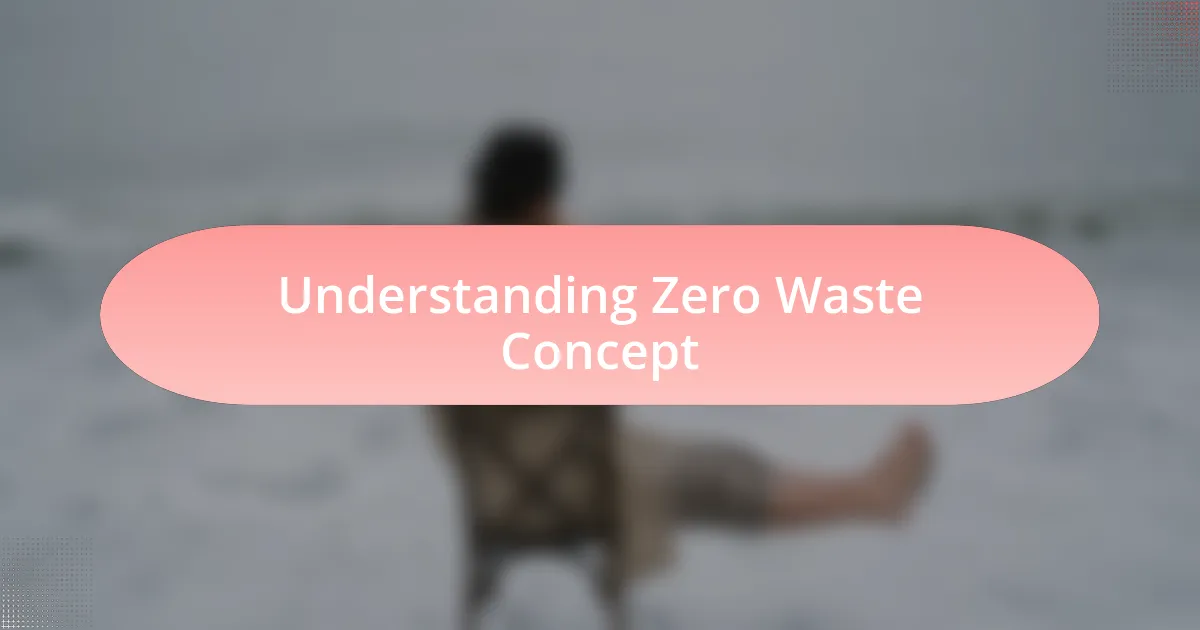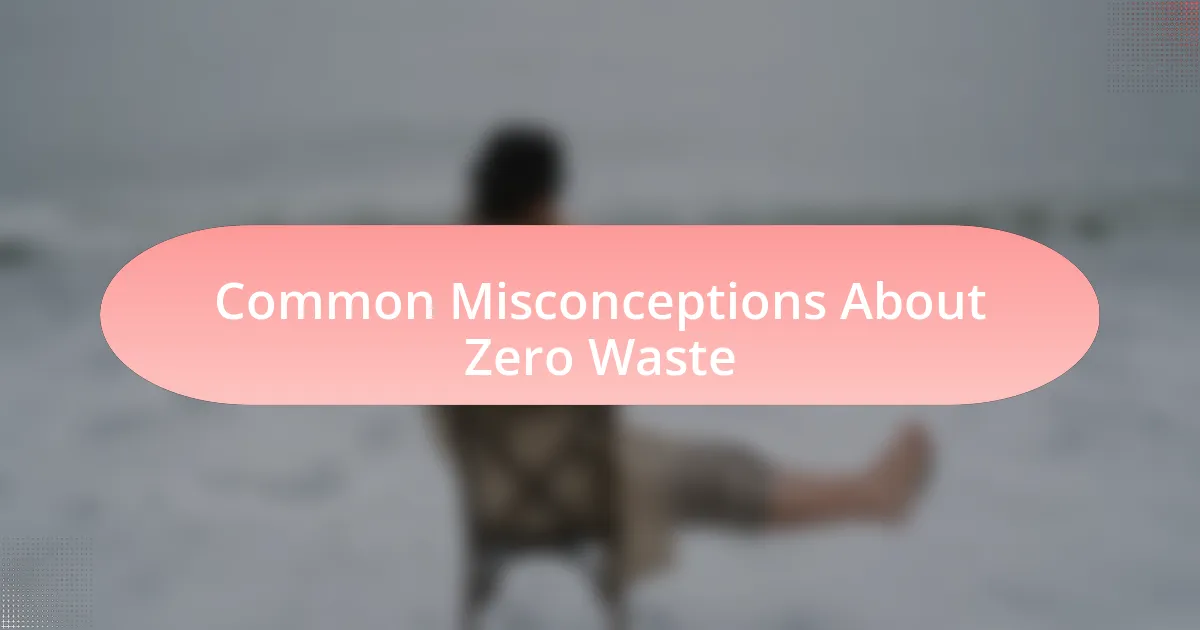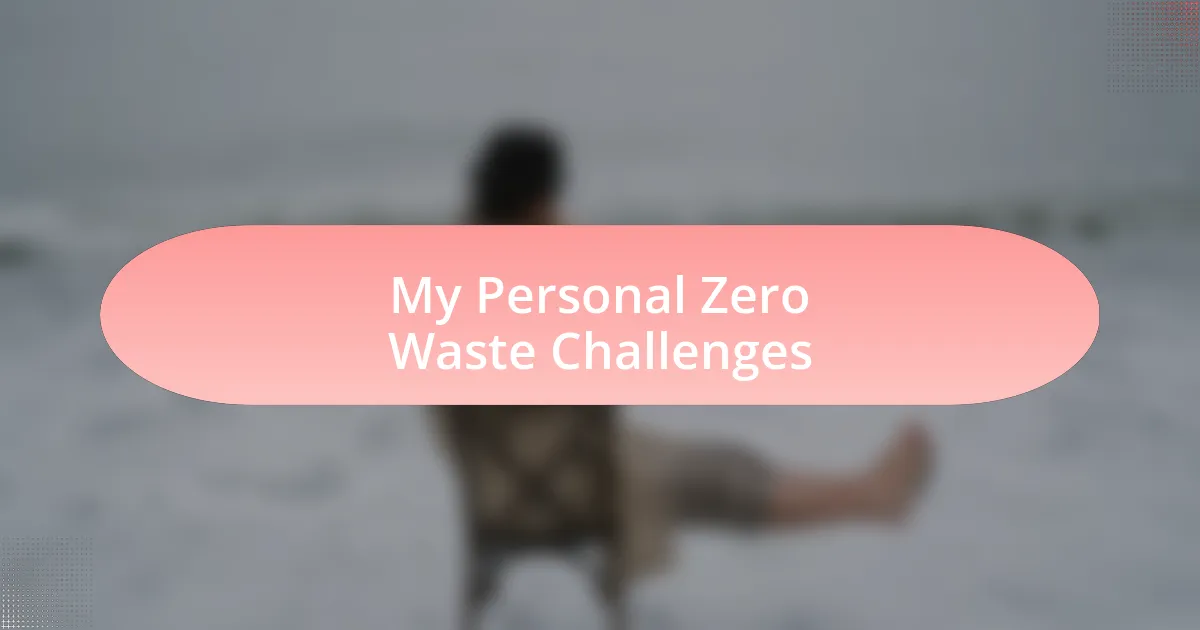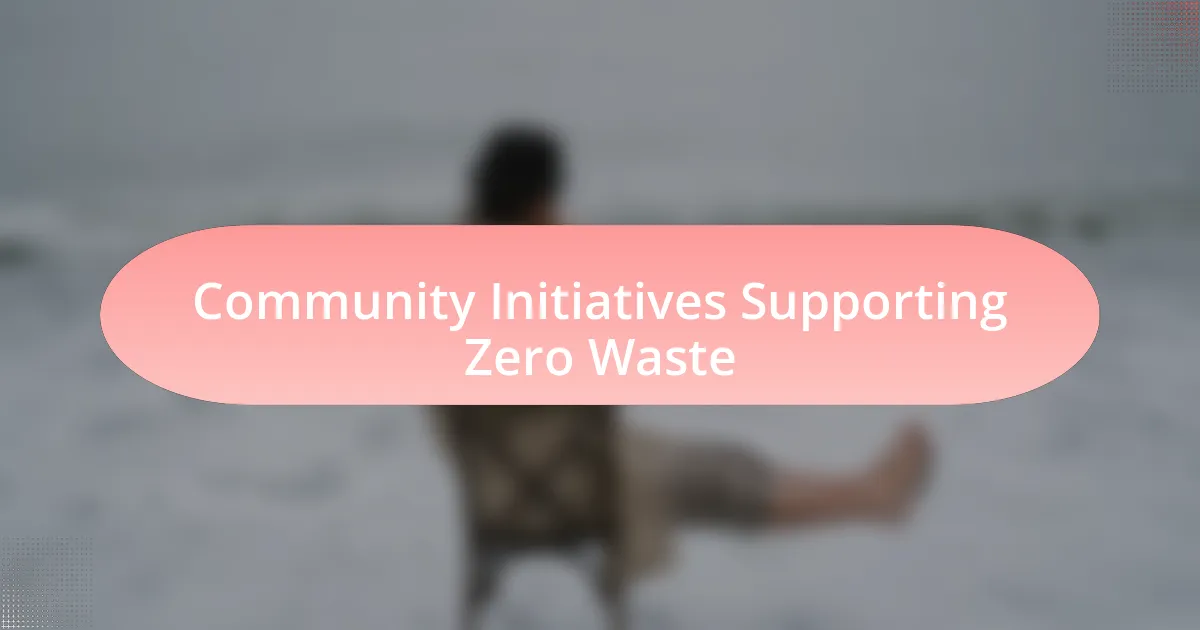Key takeaways:
- The zero waste concept focuses on reducing waste through lifestyle changes and embracing principles of reduce, reuse, and recycle.
- Common misconceptions include the belief that going zero waste requires a complete lifestyle overhaul, is only for the wealthy, and that perfection is necessary.
- Personal challenges involve managing food waste, finding packaging-free options, and dealing with social pressures surrounding waste reduction.
- Community initiatives, like cleanup events and workshops, foster collective responsibility and encourage sustainable living practices.

Understanding Zero Waste Concept
The zero waste concept is about more than just recycling; it’s a lifestyle choice aimed at minimizing waste at every stage of consumption. I remember the first time I sorted through my trash and was shocked by how much I was throwing away—much of it didn’t need to end up in a landfill. This realization prompted me to question, what if we could radically reduce our waste instead of just moving it around?
At its core, zero waste encourages us to rethink our relationship with resources. I found that making small changes in my daily routine, like using reusable bags and choosing package-free products, not only decreased my trash output but also fostered a sense of empowerment. Have you ever felt that satisfaction from making a conscious choice for the environment? It’s a rewarding feeling that deepens your connection to the planet.
Part of embracing a zero waste lifestyle involves understanding the principles of reduce, reuse, and recycle. I often reflect on how these principles play a role in everyday decisions—every time I repair an item instead of replacing it, or choose to borrow instead of buy, I’m contributing to a larger goal. Isn’t it fascinating to think about how these individual choices can collectively make a significant impact on our environment?

Common Misconceptions About Zero Waste
One common misconception about zero waste is that it requires a drastic lifestyle overhaul. I used to assume that going zero waste meant I had to throw out my conveniences and completely revolutionize my shopping habits overnight. However, I realized that it’s more about making gradual changes that fit my life—like switching to a glass jar for my morning coffee instead of a disposable cup. Have you ever thought about how even minor tweaks can lead to a significant impact over time?
Another frequent misunderstanding is that zero waste is only for the wealthy or for those with ample resources. When I first began my journey, I worried that I wouldn’t be able to afford switches, like buying bamboo toothbrushes or organic produce. But I learned that it’s often about being resourceful; I found that local farmers’ markets offer cheaper, waste-free options, and many DIY alternatives are budget-friendly. Isn’t it liberating to discover that sustainable choices can be accessible for everyone?
Lastly, many think zero waste is synonymous with perfection. I used to feel overwhelmed by the idea of always being perfectly waste-free. The truth is, I often find myself in situations where waste is unavoidable, like attending events with non-recyclable food packaging. Embracing zero waste is about progress, not perfection. It’s about making the best choices we can, even if they aren’t perfect every time—how liberating is it to just focus on doing our best?

My Personal Zero Waste Challenges
One of the most significant challenges I faced on my zero waste journey was dealing with food waste. I remember rummaging through my fridge one day, finding half-used veggies that I neglected. It struck me how often I bought more than I needed, leading to unnecessary waste. Now, I plan my meals around what I already have, but I still catch myself overcommitting sometimes. Doesn’t it feel frustrating when what we try to do for the planet ends up conflicting with our daily habits?
Another hurdle was finding suitable packaging-free options when shopping. I vividly recall walking into a local grocery store, determined to fill my reusable bags, only to feel overwhelmed by plastic-wrapped products. Initially, I felt discouraged and thought about giving up. Yet, I learned that building relationships with local vendors and frequenting farmers’ markets opens up opportunities for fresh produce without packaging. Have you ever noticed how small changes in where we shop can make a world of difference?
Finally, adjusting my mindset about personal responsibility has been a constant challenge. At times, I felt isolated because not everyone around me shared the same commitment to reducing waste. I recall an instance when my friends opted for takeout in plastic containers while I brought my own lunch. In that moment, I questioned my choices and their impact. But then I reminded myself that every effort counts. It’s about planting seeds of awareness, isn’t it? Each action, no matter how small, contributes to a broader change.

Community Initiatives Supporting Zero Waste
Across South Africa, communities are rallying together to support zero waste initiatives that empower residents and foster sustainable living. For instance, I’ve seen local groups organize cleanup events where volunteers toss aside not just litter, but also misconceptions about recycling. It made me realize how communal efforts can create a sense of collective responsibility—did you ever think about how your local park could thrive with the right support?
I remember attending a workshop hosted by a neighborhood co-op focused on upcycling and reusing everyday materials. The energy in the room was infectious! Participants shared creative ideas, turning old bottles into beautiful planters and fashioning textiles into reusable shopping bags. It struck me how collaboration can spark innovation and community spirit; have you ever experienced that powerful shift when people come together for a common cause?
Moreover, small businesses are stepping up to reduce waste by creating refill stations for household products. There’s something incredibly satisfying about filling my own container with detergent instead of reaching for a new plastic bottle. This initiative not only minimizes waste but also fosters connections among residents who frequent these local spots. Have you noticed how our choices in these venues can reflect our commitment to a sustainable lifestyle?